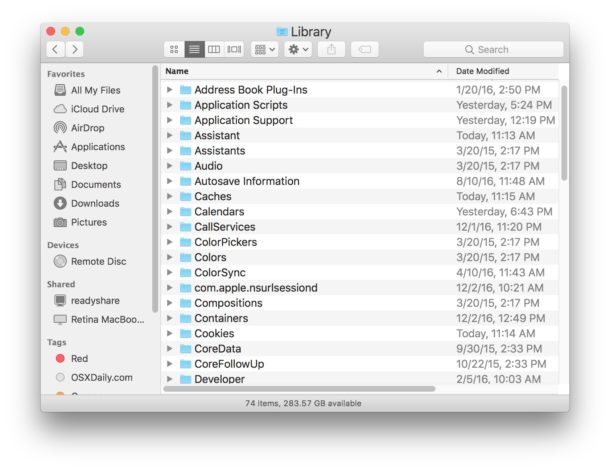
Dec 04, 2017 Or you might be customising your Mac, which will need access to certain library folders. Here is how to get there and not cause your Mac to collapse in a cloud of dust in the process. What Is The Library Folder On MacOS? The library folder is the area of your MacOS computer where app settings are stored. Working seamlessly with Mobile Worklists, Sierra liberates library staff with a mobile experience that moves library operations into the stacks and away from repetitive material handling. With MyLibrary! For Sierra, patrons can access library resources, place holds, check out digital items, and visit your library on social media all in one place on their mobile device. In this Tip's N Tricks article, I want to point out a very important tip for getting around one of Apple's more peculiar security precautions in Mac OS X Lion and Mountain Lion. By default, the User Library folder is hidden in Mac OS 10.7 and above. We'll cover a few different methods to easily access this hidden folder. By default, the User Library folder is hidden in Mac OS 10.7 and above. We'll cover a few different methods to easily access this hidden folder. The User Library is home to many 'under the hood' files and folders that correspond to the various Apps and system processes in your computer.
Access Library Mac Sierra Drive
While many Mac users may never need to access their User Library folder while running macOS Sierra — some advanced users, may need to get in there and access support data and such when troubleshooting. The folder is hidden by default in macOS Sierra, but it only take a few moments to access it, or make it so that the folder is always visible.
Before we begin, we want to say that it’s usually a good idea to leave things in the users ~/Library folder alone, unless directed to by support personnel. The folder contains caches, application support data, and preference files, and if you screw around in there too much, you could really screw things up. We DO NOT recommend it. Now that our butts are covered, here’s how to find and display your User Library folder.
Opening the User Library Folder in macOS Sierra
If you just need to access the user ~/Library folder on occasion, you can get into it by using the Finder “Go” menu.
- From the Finder in macOS, (Click anywhere on the Desktop where there isn’t already an app window, and you should see “Finder” appear in the upper left hand corner of your display, up near the Apple icon), click the “Go” menu item, and then hold down the SHIFT key on your Mac’s keyboard.
- Click on “Library” in the drop-down list. (If you release the SHIFT key, the “Library” option will disappear from the menu. Now you see it, now you don’t.)
If you’re not much of a mouser, you can just hit the key combo of Command + Shift + L, and a Finder window will appear showing the ~/Library directory of the active user account.
Always Show the User Library Folder in macOS Sierra
If you are an advanced user, you might want to always display the user ~/Library folder in your user Home directory. It just takes a few clicks to enable this option.
- In Finder, go to the Users’ home folder
- Click the “View” menu and then click “View Options”
- Click the “Show Library Folder” option in the Settings options for the User home folder, as shown below.
Following the above steps will change the settings for only the current user. Any other users will also have to follow the above steps while logged into the machine.
These steps also work with Mac OS X El Capitan and Yosemite. In earlier versions of OS X, a command line entry was required to perform the same magic.
(Thanks to OS X Daily)

Perhaps, OS X 10.6 Snow Leopard could be the last Mac OS that allowed easy access to user library folder. Thereafter, we saw a number of Mac operating systems wherein accessing user library was a hard task forever the power users.
Mac Sierra Download
Fortunately, in newer Mac versions, the difficulty in accessing this folder has considerably reduced. Apart from its security and optimized storage features, mac Sierra – the latest macOS version, is not different from these mac versions.
What You’ll Get from This User Library Folder?
Well, it’s the place where Mac power users cannot skip or avoid. It’ll contain preferences, files, cache, application support data and much more. But, for an ordinary or casual user, it should say that there is no space for them.
Moving User Library Folder into Favorites in mac Sierra:
Method 1
1. Open your Finder Menu. Select Go -> Go to Folder.
2. A new Window “Go to Folder” will appear now. Enter “~/Library” in the text box (without quotes) and click Go.
3. Your hidden user library folder will be displayed now.
4. Locate the Library logo at the top of the window. Click it, drag and drop into favorites section. That’s it - your User Library will be permanently pinned into your favorites section from now onwards.
Method 2:
There’s always a second way – perhaps the easiest one. In this time, if you hold Option while opening Go menu in Finder, you’ll see the same Library option. From Mac Finder, if you press Command + Shift + L , you can immediately jump to this menu.
Method 3:
There’s a final method and it’s purely based on command lines. Open your Terminal and execute this command over there.
chflags nohidden ~/Library/
It'll make your hidden library folder into a public one.
Download Mac Sierra
Note: All these methods also work in Mac versions El Capitan and Yosemite. If any of these methods are not working, let me know us by your valuable comments.